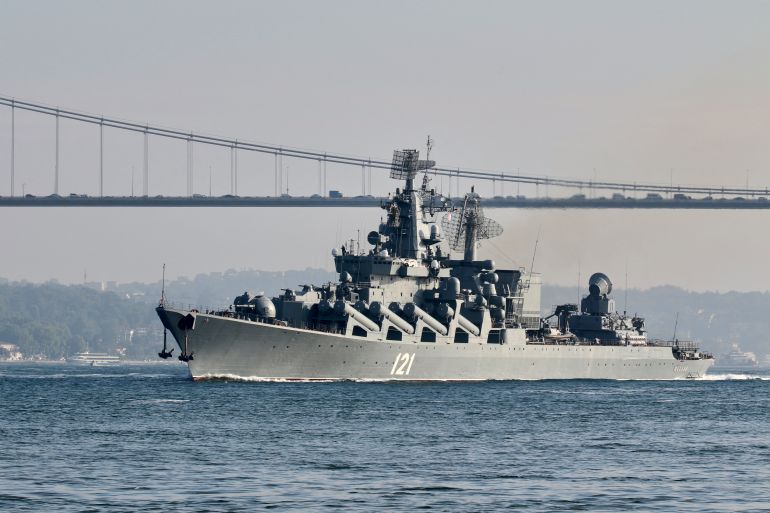Russian flagship Moskva ‘seriously damaged’ by explosion
Russia says damage caused by ammunition detonating ‘as a result of a fire’; Ukraine says it targeted the vessel with missile strikes.

Russia’s Black Sea flagship leading the naval assault on Ukraine has been “seriously damaged” by an explosion that Ukrainian officials said was the result of a missile strike.
Russia said the Moskva was badly damaged by a fire that forced the warship’s evacuation but it was still afloat.
Keep reading
list of 4 itemsRussia-Ukraine latest updates: Russia says warship has sunk
Ukraine braces for new Russian assault in the east
German FM urges end to Mali’s cooperation with Russian forces
The damage to the missile cruiser was caused by ammunition detonating “as a result of a fire”, the Russian defence ministry was quoted by state media on Thursday as saying, adding the cause of the blaze was being investigated.
The governor of Odesa said Ukrainian forces hit the vessel with missile strikes, while presidential adviser Oleksiy Arestovych said “we don’t understand what happened”.
Ukraine’s southern military command later said it hit the Moskva with a Neptune missile on Wednesday, causing significant damage and the ship started sinking.
The Neptune is an anti-ship missile that was recently developed by Ukraine and based on an earlier Soviet design. The launchers are mounted on trucks stationed near the coast and, according to the Washington-based Center for Strategic and International Studies, the missiles can hit targets up to 280km (175 miles) away.
Removal from combat
The southern military command said Russian rescue ships were hampered by ammunition exploding on board as well as bad weather that caused the Moskva to start sinking.
The Russian defence ministry said the crew was evacuated, but “the ship was seriously damaged” and measures were being taken to tow it back to port. Typically, a vessel that size would have 500 sailors on board.
The ship carries 16 long-range missiles and its removal from combat would greatly reduce Russia’s firepower in the Black Sea.
It was not immediately possible to reconcile the vastly different accounts, and cloud cover made it impossible to locate the ship or determine its condition based on satellite photos.
Regardless of the extent of the damage, any attack would represent a major blow to Russian prestige seven weeks into the war.
The loss of the warship named for the Russian capital would be a major military and symbolic defeat for Moscow as its troops regroup for a renewed offensive in eastern Ukraine after retreating from much of the north, including the capital Kyiv.
The United States was not able to confirm Ukraine’s claims of striking the warship, American national security adviser Jake Sullivan said on Thursday. Still, he called it “a big blow to Russia”.
“They’ve [the Russians] had to kind of choose between two stories: One story is that it was just incompetence and the other was that they came under attack, and neither is a particular the good outcome for them,” Sullivan told the Economic Club of Washington.
The Moskva is the second major ship known to have suffered serious damage since the start of the war. Last month Ukraine said it destroyed a landing support ship, the Orsk, on the smaller Sea of Azov.
‘Menaced from the sea’
The news of the flagship’s damage overshadowed Russian claims of advances in the southern port city of Mariupol, where they have been battling the Ukrainians since the early days of the invasion in some of the heaviest fighting of the war – at a horrific cost to civilians.
Moscow’s Black Sea fleet is blockading Mariupol and is off the coast of Odesa, with its ships used to bombard coastal cities.
The Moskva gained notoriety early in the war when it called on Ukrainian border troops defending the strategic Snake Island to surrender, only to be defiantly refused. In an audio widely circulated online, a Ukraine soldier responds: “Russian warship, go [expletive] yourself.”
It was previously deployed in the Syrian conflict where it served as naval protection for the Russian forces’ Hmeimim airbase.
With the war entering its seventh week, US President Joe Biden announced an $800m military aid package for Ukraine that included helicopters and armoured personnel carriers.
“Without getting into sensitive operational issues, the president did go to NATO a few weeks ago and indicate to our allies that we are looking to facilitate the supply of coastal defence and anti-ship capabilities to the Ukrainians so that they can’t be menaced from the sea. And that is being actively worked. And I’ll leave it at that,” said Sullivan.
Having initially expected to swiftly overcome its neighbour, Russia has faced fierce resistance, leading Moscow on Wednesday to threaten to strike command centres in Kyiv if Ukraine continues to launch attacks on Russian soil.